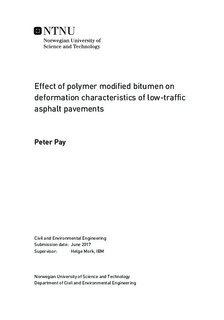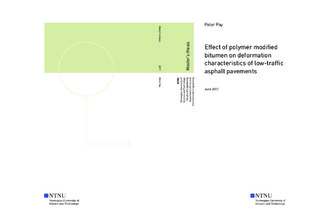| dc.description.abstract | Low-volume roads with an AADT less than 3000 make up 90 % of the Norwegian road network. Although considerable effort is being made to improve its quality, deterioration of existing low-volume roads is a significant concern. There are many deterioration mechanisms which affect Norwegian low-volume roads. The literature study conducted for this thesis found that permanent deformation and rutting in the asphalt pavement caused by heavy traffic loads and climatic conditions one of the most substantial types of distress on low-volume roads.
Polymer modification of bitumen has been shown to improve the stability of asphalt pavements and significantly reduce rutting. The literature regarding use of polymer modified bitumen on low-volume roads is, however, limited. This study will investigate the effect polymer modification of bitumen has on the deformation characteristics of low-traffic asphalt pavements. Low-volume roads with a high percentage of heavy vehicles are exposed to greater traffic loads than regular low-volume roads. To increase pavement lifetime, it is possible to use polymer modified binder instead of neat bitumen. Research reviewed during the work for this thesis show improved resistance to permanent deformation and rutting of asphalt mixtures containing polymer modified bitumen.
To evaluate the potential polymer modified bitumen has for use in pavements for low-volume roads with considerable amounts of heavy traffic, an experimental program was carried out. Performance Grading of two polymer modified binders and two neat bitumens was done, and Multiple Stress Creep Recovery Test was conducted to evaluate and compare the two polymer modified binders under heavy traffic loading. Wheel Track testing of AC11 mixtures with neat and polymer modified bitumen was used to assess the effect of polymer modified binder has on rutting resistance. The results of the PG-classification show that the two polymer modified binders meet the criteria for permanent deformation resistance at both higher and lower temperatures for rutting and low-temperature cracking respectively than the neat bitumens. Comparison of two different polymer modified binders in the Multiple Stress Creep Recovery test showed that one of the modified binders had significantly improved rutting resistance under heavy traffic loads. The results from the Wheel Track test indicate that use of polymer modified binder can significantly decrease rutting in asphalt concrete mixture. Based on the results acquired from the laboratory testing and research reviewed during the literature study, it seems likely that an increase in pavement lifetime can be expected if using polymer modified bitumen on low-volume roads with a considerable amount of heavy traffic | |

